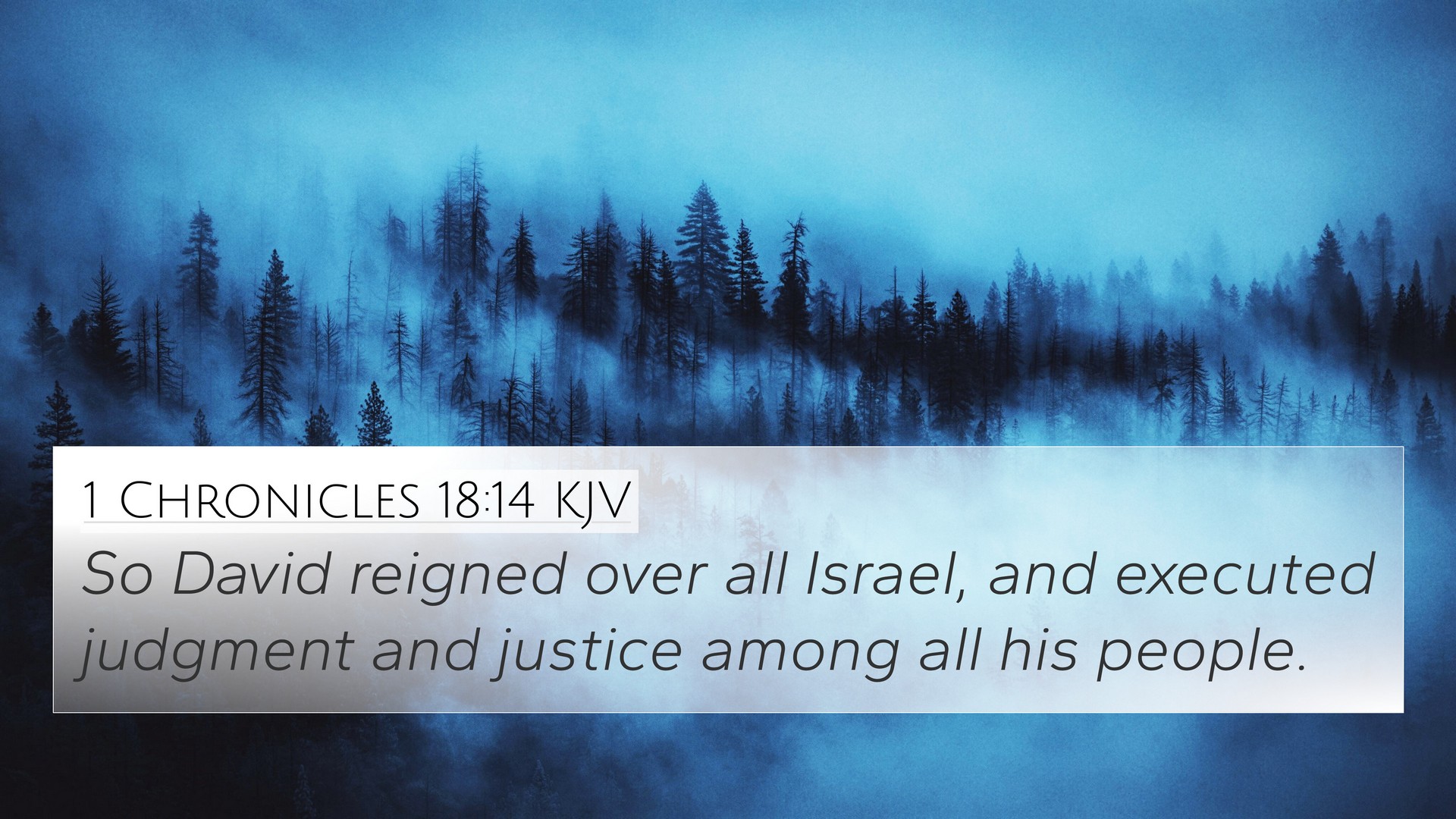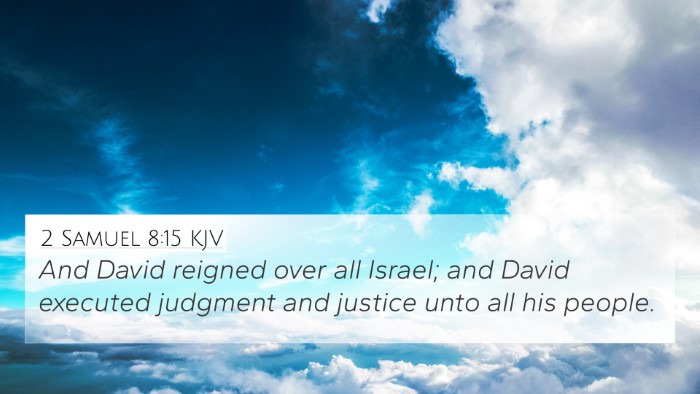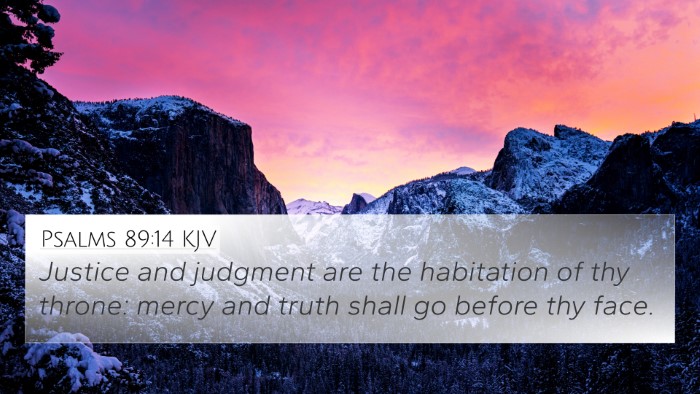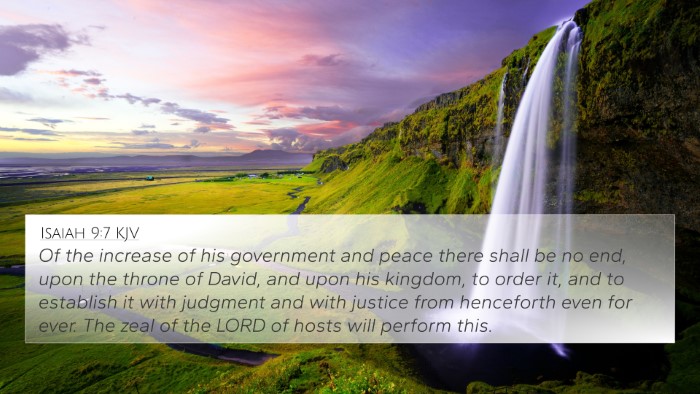Understanding 1 Chronicles 18:14
Verse: 1 Chronicles 18:14
“So David reigned over all Israel, and executed judgment and justice among all his people.”
Summary of the Verse's Meaning
This verse encapsulates the essence of King David's reign, highlighting his role as a just and fair ruler. Public domain commentaries shed light on the implications of this leadership style, the context of his reign, and the moral obligations that come with such power.
Insights from Commentaries
Matthew Henry's Commentary:
- Henry emphasizes the significance of justice in leadership, noting that David's ability to govern justly was indicative of God's favor and guidance.
- He also points out that a ruler's integrity is vital for the well-being of the nation, and that David set a precedent for future leaders.
Albert Barnes' Notes:
- Barnes explains that executing judgment and justice reflects David's commitment to God's law and his responsibility to the people.
- He suggests that David's approach to governance was exemplary and serves as a model for modern leaders.
Adam Clarke's Commentary:
- Clarke elaborates on the social order during David's reign, indicating that it was a time of great prosperity and stability due to his righteous rule.
- He also highlights David's role in unifying the tribes of Israel under a just king.
Thematic Connections with Other Scriptures
This verse connects with several key themes in both the Old and New Testaments. Below are some related verses that echo similar themes of justice and leadership:
- 2 Samuel 8:15: "And David reigned over all Israel; and David executed judgment and justice unto all his people." (A parallel highlighting David's just reign.)
- Psalms 72:1-2: "Give the king thy judgments, O God, and thy righteousness unto the king's son." (A plea for righteous leadership.)
- Proverbs 29:2: "When the righteous are in authority, the people rejoice: but when the wicked beareth rule, the people mourn." (The impact of just leadership.)
- Isaiah 9:6: "For unto us a child is born, unto us a son is given: and the government shall be upon his shoulder: and his name shall be called Wonderful, Counselor, The mighty God, The everlasting Father, The Prince of Peace." (The ultimate righteous leader.)
- Micah 6:8: "He hath shewed thee, O man, what is good; and what doth the Lord require of thee, but to do justly, and to love mercy, and to walk humbly with thy God?" (A call to societal justice.)
- Romans 13:1-4: "Let every soul be subject unto the higher powers. For there is no power but of God: the powers that be are ordained of God." (The divine nature of rightful governance.)
- Hebrews 13:17: "Obey them that have the rule over you, and submit yourselves: for they watch for your souls, as they that must give account." (The responsibilities of rulers toward those they govern.)
Importance of Justice in Leadership
The call for leaders to embody justice is a recurring theme in the Bible. This theme emphasizes that:
- Justice is God's expectation: Leaders are accountable to God for their administration.
- Society thrives under just leadership: When leaders practice righteousness, the people flourish.
- Faith informs governance: A commitment to God's principles can lead to equitable leadership.
Cross-Referencing Biblical Texts
To fully grasp the implications of 1 Chronicles 18:14, a cross-referencing Bible study can uncover deeper insights:
- Utilize tools for Bible cross-referencing like a Bible concordance or Bible cross-reference guide.
- Engage in cross-reference Bible study to identify additional nuggets of wisdom in Scripture that pertain to governance.
- Explore thematic Bible verse connections to derive lessons from leaders mentioned throughout the Bible.
Practical Applications for Today
The principles derived from David's reign resonate today and can inform our understanding of leadership in various spheres:
- Integrity in leadership: Current and aspiring leaders should strive for righteousness.
- Accountability: Leaders must recognize their duty towards their constituents.
- Community well-being: Just leadership is crucial for societal harmony and progress.
Conclusion
1 Chronicles 18:14 serves as a powerful reminder of the qualities necessary for effective leadership. Through understanding the context and implications of this verse and cross-referencing it with other relevant Scriptures, one can gain a deeper appreciation of the Biblical perspective on justice and governance. By following these themes, leaders can learn to uphold the moral standards set forth in the Scriptures, fostering an environment where righteousness prevails.











